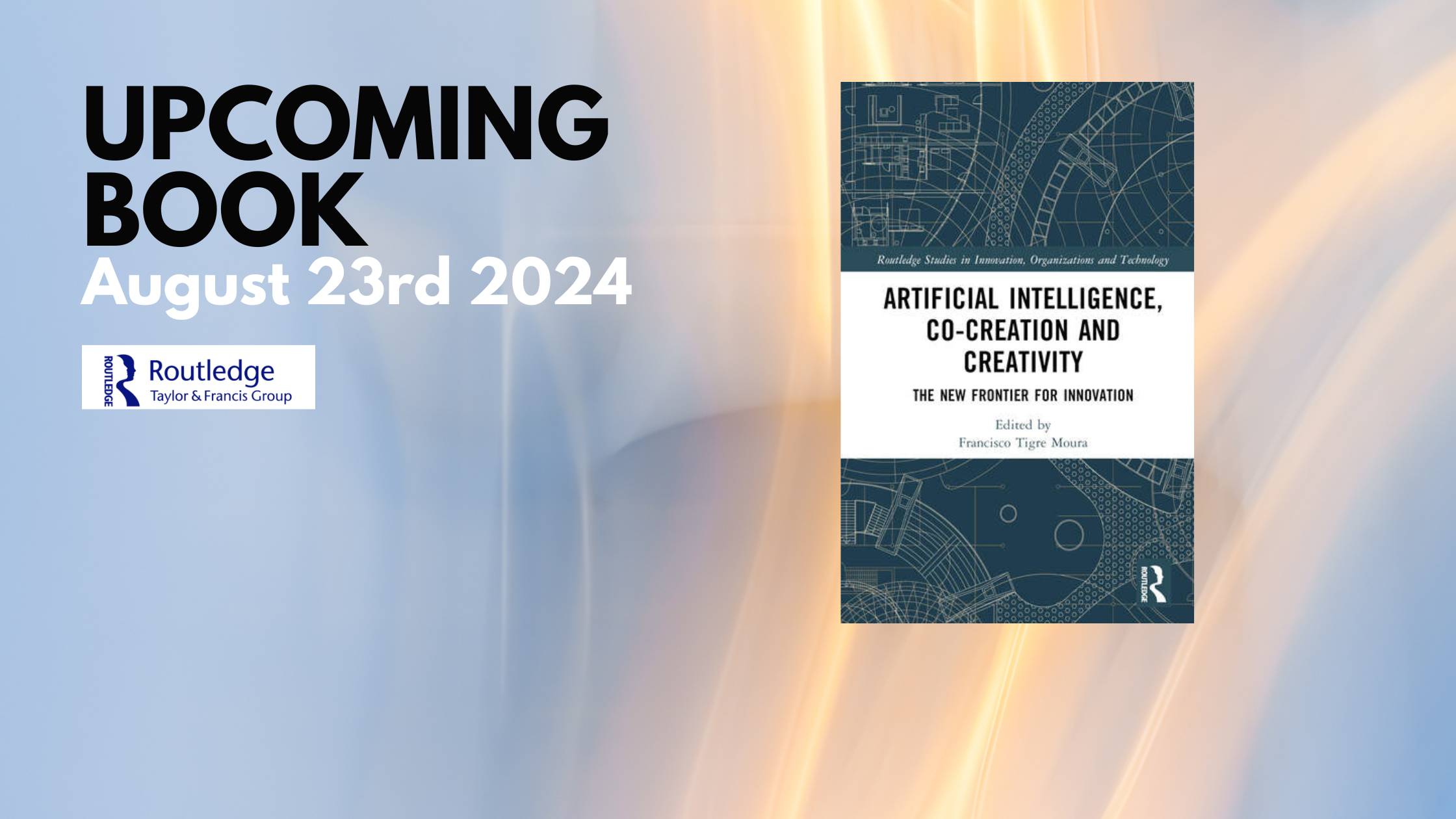I am thrilled to announce the upcoming launch of a pivotal and transformational book titled “Artificial Intelligence, Co-Creation, and Creativity: The New Frontier for Innovation“. Scheduled for release by Routledge Taylor & Francis Group on August 23rd, 2024, this book is the result of collaborative contributions on how artificial intelligence impacts and intersects with creativity.
This soon-to-be-released book discusses the importance of understanding the dynamics of co-creation in an era where AI is not just reshaping industries but also revolutionizing creative processes. Various chapters in the book assume a critical voice in discussing the connection between AI and creativity while reflecting on the role of humans in artificial co-creative processes.
The book contains 16 chapters and represents the collective efforts of 26 authors from all over the globe. It is structured into three distinct parts, providing a comprehensive perspective on how humans can enhance their creative capabilities through creative co-creative processes with AI and reflect critically on the consequential impacts.

Here is the Table of Contents:
Introduction: “Artificial Intelligence, Co-Creation, and Creativity: The New Frontier for Innovation” (Francisco Tigre Moura)
PART 1: PRINCIPLES OF AI AND CREATIVITY
1. AI Creativity in The Light of Autonomy (Ali Nikrang, Karin Breckner, Thomas Neumayr, Frederik Hirschmann and Mirjam Augstein)
2. Creativity as a Socio-Technical Phenomenon (Mariya Dzhimova)
3. Rethinking Creativity Frameworks for Artificial Intelligence (Francisco Tigre Moura)
4. Creative Sense-Making (Nicholas Davis)
5. Demystifying AI Techniques for Creative Domains (Thorsten Fröhlich).
PART 2: CRITICAL ISSUES ON ARTIFICIAL CREATIVITY
6. Creating Images with Generative AI (Claire Anscomb)
7. AI And Art: Non-Human, Still Human, Or All Too Human? (Caterina Moruzzi and Oreste Campagner)
8. AI and Creativity in Marketing (Pasha Abkenar, Francisco Tigre Moura and Clare Hindley)
9. On the Test Bench: How to Evaluate the Quality of AI Systems? (André Hollstein)
10. Copyright Aspects of Generative AI in Germany and the EU (Stefan Ellenberg)
11. AI Creativity and Human Enhancement (Kristina Khutsishvili)
PART 3: INDUSTRY SPECIFIC DISCUSSIONS
12. Make Some Noise: Digital Art and Artificial Intelligence (Trevor Borg, Elena Said, Jonathan Attard and Dylan Seychell)
13. Exploring Perceptions and Usage of Generative Artificial Intelligence (Tobias Naujoks, Benjamin Schulte and Cansu Hattula)
14. Co-Creation with Artificial Intelligence in Marketing (Nicole Lontzek)
15. Artificial Intelligence as A Creative Scientist (Markus C. Hemmer)
16. Recent Advancements and Use Cases on Co-Creation, Procedural Content Generation, And Computational Creativity in Video Games (Elif Surer)
Conclusion: “Embracing Human-AI Co-Creation: Navigating Through Opportunities and Challenges” (Francisco Tigre Moura)
The first section, ‘Principles of AI and Creativity’, contains five chapters, provides the basis fo0r the understanding of AI and creativity. Chapters titles include, for example, “AI creativity in the light of Autonomy”, “Rethinking creativity frameworks for artificial intelligence”, what constitutes ‘Creative Sense-Making’, and “Demystifying AI techniques for creative domains”.
Part two entitled ‘Critical Issues on Artificial Creativity’ examines pressing issues of great relevance for academics and the industry. This includes taking an in-depth look at “creating images with Generative AI”, the intersection of AI and Art, the role and influence of AI in marketing, and decoding the quality evaluation of AI systems. Additionally, it covers the legal side, listing the copyright aspects of generative AI in Germany and the EU, and finally explores the topic of AI creativity and human enhancement.
The book’s final section, ‘Industry Specific Discussions’, focuses on issues that are context specific. The topics covered here include digital art and AI, perceptions and usage of generative AI, co-creation with AI in marketing, AI as a creative scientist, and discussing recent advancements in co-creation, procedural content generation, and computational creativity in video games.
I would like to sincerely thank and congratulate all authors who participated in this project. Their valuable input, passionate involvement, and dedicated efforts were vital for this book to happen. I am really looking forward to seeing the physical copies become available on August 23rd.
I honestly hope that “Artificial Intelligence, Co-Creation, and Creativity: The New Frontier for Innovation” will provide a valuable contribution to the understanding of AI in contemporary creative practices.
For more information about the book, click HERE.
Stay tuned for the release, which promises to spark conversations, ignite latent creativity with AI, and co-create the future of innovation.







